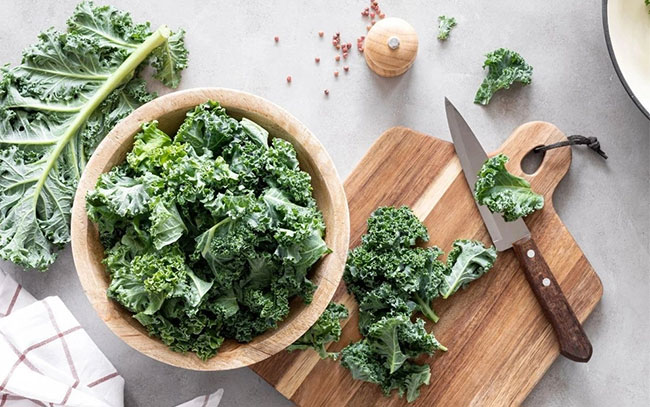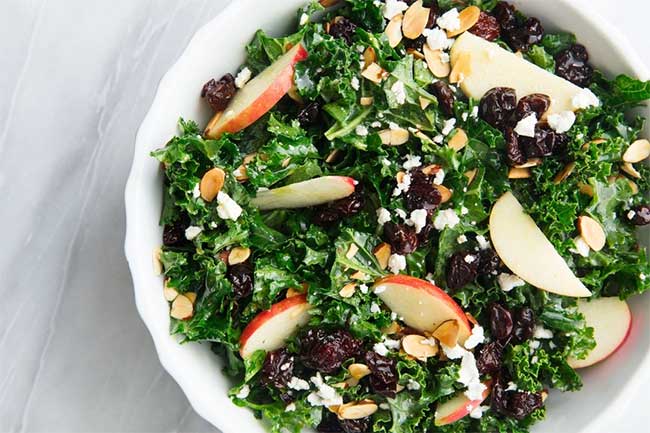Kale is rich in antioxidants and minerals such as iron, manganese, calcium, and potassium. It helps combat heart disease by lowering cholesterol and supports weight loss.
Benefits of Kale
Kale is a popular leafy green vegetable that belongs to the cabbage family, which includes cabbage, broccoli, cauliflower, collard greens, and Brussels sprouts. There are various types of kale, with leaves that can be green or purple, smooth or curly.

Kale is nutrient-dense and very low in calories. (Photo: Hindustannewshub).
According to Healthline, a cup of fresh kale weighing about 67 grams contains vitamin A, vitamin K, vitamin C, vitamin B6, manganese, calcium, and many other nutrients.
The mentioned amount of kale totals 33 calories, 6 grams of carbs (of which 2 grams are fiber), and 3 grams of protein. Kale contains very little fat, but most of the fat is omega-3 fatty acids.
With an extremely low calorie count, kale is one of the most nutrient-dense foods available. Eating more of this food is a great way to significantly increase the overall nutrient content of our diets.
Rich in Powerful Antioxidants
Kale, like other leafy greens, is very high in antioxidants such as quercetin, kaempferol, and beta-carotene.
Antioxidants help combat oxidative damage caused by free radicals in the body. Oxidative damage is believed to be one of the leading causes of aging and many diseases, including cancer.
Additionally, kale contains significantly more vitamin C than most other vegetables, about 4.5 times that of spinach. Vitamin C is a water-soluble antioxidant that serves many important functions in the body’s cells.
Reduces Risk of Heart Disease
Kale may lower cholesterol levels, leading to a reduced risk of heart disease over time.
Research shows that drinking kale juice daily for 12 weeks increases HDL cholesterol (the good cholesterol) by 27% and lowers LDL cholesterol (the bad cholesterol) by 10%. At the same time, it also improves antioxidant status.
Best Source of Vitamin K
Vitamin K is an essential nutrient, especially for blood clotting. It does this by “activating” certain proteins and allowing them to bind calcium. A cup of fresh kale contains about 7 times the recommended daily intake of vitamin K.
The form of vitamin K in kale is K1, which is different from K2. Vitamin K is found in fermented soy foods and certain animal products, which help prevent heart disease and osteoporosis.
Contains Many Anti-Cancer Compounds
Kale is rich in compounds believed to protect against cancer. One of these is sulforaphane, a compound shown to help combat cancer formation at the molecular level.

Powerful antioxidants found in kale, including quercetin and kaempferol, have many beneficial effects on health. (Photo: Delish).
Kale also contains indole-3-carbinol, another compound believed to help prevent cancer.
Studies have shown that cruciferous vegetables (including kale) can significantly reduce the risk of certain cancers, although evidence in humans varies.
Very High in Beta-Carotene
People often think that kale is high in vitamin A, but this is not entirely accurate. It actually contains a lot of beta-carotene, an antioxidant that the body can convert into vitamin A. Therefore, kale can be an effective way to increase vitamin A levels in the body.
Rich in Minerals Most People Don’t Get Enough Of
Kale is rich in minerals that some people often lack, such as calcium, magnesium, and potassium.
Research indicates that consuming more magnesium can help the body combat type 2 diabetes and heart disease. Meanwhile, increasing potassium intake is associated with lower blood pressure and reduced risk of heart disease.
One advantage kale has over other greens, including spinach, is that it contains low oxalate levels, a substance found in some plants that can hinder mineral absorption.
Helps Protect Eye Health
One of the most common consequences of aging is declining vision. Fortunately, certain nutrients in the diet can help prevent this from happening.
Two of the main nutrients are lutein and zeaxanthin, carotenoid antioxidants found in high amounts in kale and some other foods.
Many studies show that individuals who consume enough lutein and zeaxanthin have a significantly lower risk of age-related macular degeneration and cataracts, which are two very common eye disorders.
Supports Weight Loss
Kale has several properties that make it a weight-loss-friendly food.
It is low in calories but still provides a significant amount of bulk to help you feel full. Due to its low calorie count and high water content, kale has a low energy density. Eating more low-energy-dense foods has been shown to assist in weight loss in many studies.
Kale also contains a small amount of protein and fiber. These are two of the most important nutrients when it comes to weight loss. Although no studies have directly examined kale’s effects on weight loss, it may be a useful addition to a weight-loss diet.


















































